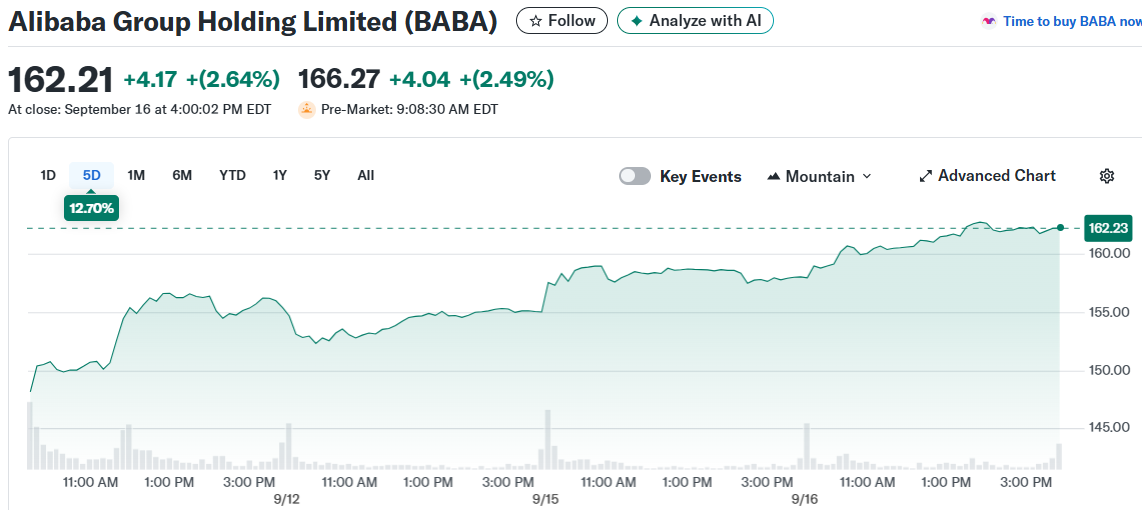TLDR
- Alibaba stock rose after China Unicom agreed to use its Pingtouge AI chips in a new data center, marking broader adoption of homegrown alternatives to Nvidia technology
- Jack Ma has quietly returned to Alibaba offices and is more involved in operations than he has been since 2019, though he holds no formal position
- SMIC began testing China’s first domestically produced advanced lithography machine to reduce dependence on ASML equipment
- Alibaba pledged $53.5 billion over three years for AI infrastructure expansion as part of China’s push for tech self-sufficiency
- The company’s stock has surged 91% year-to-date, reaching new 52-week highs as cloud business grew 26% in the latest quarter
Alibaba Group shares jumped in premarket trading Wednesday after reports confirmed China Unicom will deploy the company’s Pingtouge AI chips in a major new data center. The deal represents a win for Beijing’s efforts to build domestic alternatives to restricted U.S. technology.
The state-owned wireless carrier will install Alibaba’s T-Head AI accelerators in a northwestern China facility. The chips will work alongside accelerators from MetaX and Biren Technology in the new data center.
China Unicom’s decision marks broader adoption of Alibaba’s homegrown processors. The T-Head chips now compete directly with Huawei’s Ascend processors and Cambricon’s offerings in the domestic market.
Alibaba Cloud has already delivered tens of thousands of AI chips to Unicom facilities according to CCTV reports. The partnership comes as U.S. export restrictions block access to Nvidia’s most advanced accelerators.
The e-commerce giant has committed 380 billion yuan ($53.5 billion) over three years to expand AI infrastructure. This investment forms part of China’s broader strategy to reduce dependence on American technology suppliers.
Meanwhile, Jack Ma has quietly returned to Alibaba’s offices with more involvement than he has shown since 2019. Bloomberg reports Ma influenced the company’s decision to spend up to 50 billion yuan on subsidies to counter rival JD.com.
Ma holds no formal position but receives daily updates on cloud computing, proprietary chips, and AI development projects. His return signals potential renewed government support for China’s tech sector.
China’s Semiconductor Independence Push
China’s semiconductor self-sufficiency efforts gained momentum as SMIC began testing domestically produced lithography equipment. The Financial Times reported that Semiconductor Manufacturing International Corp. started trial runs of China’s first advanced homegrown lithography machine.
Shanghai-based startup Yuliangsheng developed the deep-ultraviolet tool now being tested by SMIC. The company aims to use the equipment to produce advanced AI processors without relying on foreign suppliers.
SMIC and other Chinese firms have historically depended on ASML’s lithography systems. Most of this equipment was purchased before U.S. export controls restricted sales to Chinese companies.
The Netherlands continues blocking shipments of ASML’s extreme ultraviolet tools to China. This ban prevents domestic production of cutting-edge chips that power Nvidia’s top AI models.
SMIC engineers are testing a 28-nanometer DUV system using multi-patterning techniques to achieve 7-nm output. Sources suggest yields could potentially extend to 5-nm production capabilities.
Stock Performance and Market Position
Alibaba’s stock has surged more than 91% year-to-date, recently surpassing its 52-week high of $163. The company’s cloud business delivered 26% growth in the latest quarter, its fastest expansion in years.

Ma stepped away from public view after criticizing Chinese lenders in 2020. Regulators subsequently halted the IPO of Alibaba’s affiliate Ant Group, triggering a broader tech sector crackdown.
The regulatory action wiped nearly $700 billion from the company’s market value. Alibaba’s current market capitalization of $380 billion remains less than half its peak valuation.
Group chairman Joe Tsai and CEO Eddie Wu officially lead the company’s operations. Wu oversees the group’s artificial general intelligence push backed by a $57 billion three-year investment plan.
Beijing has set targets to triple domestic chip output by 2026 using stockpiled ASML equipment. Homegrown machines are expected to contribute meaningfully by 2027 as China reduces foreign technology dependence.
BABA stock traded 2.34% higher at $166.01 in premarket Wednesday trading.






